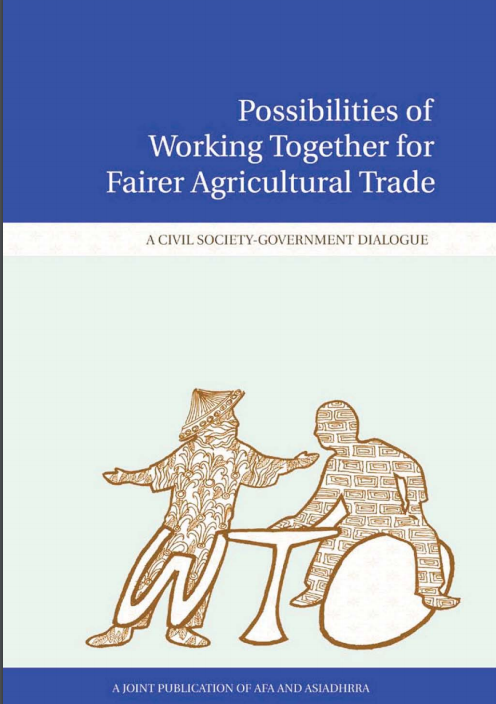CONFERENCE PROCEEDINGS
The sixth Ministerial Conference of the World Trade Organization is scheduled in December 2005, in Hongkong. Agriculture, through the Agreement on Agriculture (AoA) undertaking, is still top of the agenda. With Asian farmers bearing the brunt of lopsided global agricultural trade policies, this sector should be well-informed about developments on this issue and should be involved in the discussions at both the national and international levels. The continuing alliance of developing nations forged during the WTO Ministerial Meeting in Cancun, Mexico, such as the G20 and G33, have to be encouraged, and this encouragement can come from civil society groups who have positive engagement with their own governmental negotiators.
The Asian Partnership for the Development of Human Resources in Rural Areas ( AsiaDHRRA) and the Asian Farmers’ Association for Sustainable Rural Development (AFA), jointly organized this dialogue as part of their efforts to increase the awareness of their leaders about the developments in the current WTO round of talks as well as to engage like-minded trade negotiators and civil society leaders at the regional level on how best to approach trade talks such that small farmers in their countries can be better protected and be able to reap more benefits from global trade.
Participants to this dialogue, entitled, “Civil SocietyGovernment Dialogue: Possibilities of Working Together” came from participants to two activities dovetailed with each other. The first was “Second Asian Leaders’ Dialogue (ALD)”, attended by leaders of various non-government organizations in Asia. The second activity was “Thailand Farmers’ Exchange Visit (FEV): Farmers’ Sustainable Initiatives and Advocacy in Response to Globalization Challenges,” attended by farmer leaders and their translators. This dialogue was the first part of these two activities. The ALD activity ran until March 5 and the FEV until March 8. The dialogue was a joint activity of both AsiaDHRRA and AFA. We were encouraged by the results of this dialogue. Building on this, we are conductiong follow-up dialogues both at the country and regional levels, from September to November 2005. AFA and AsiaDHRRA members are jointly cooperating in a WTO 2005 campaign which seeks to increase awareness of more farmer members on WTO issues and their capabilities to engage their governments on international issues that affect their lives.



